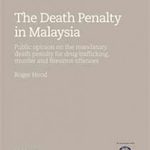
A new report by the London-based Death Penalty Project explores the use of mandatory death sentencing in Malaysia. In the U.S., the Supreme Court barred the use of mandatory death sentences in 1976, holding that judges and juries needed to consider the individual differences among defendants, out of respect for human diginity. (Woodson v. North Carolina, and other opinions). DPP’s report found that the number of executions carried out in Malaysia has declined in the last decade even though there have been no major changes in law or reforms in the system. As part of the research, a poll was conducted to discern the public’s support for mandatory death sentences. The poll found little public opposition to abolishing the mandatory death penalty for drug trafficking and firearms offenses, though 56% of respondents still supported a mandatory death sentence for murder. Read full text of the report.
(R. Hood, “The Death Penalty in Malaysia,” Death Penalty Project, July 2013; DPIC posted, August 6, 2013. ). See International and Studies.
International
Oct 11, 2024


